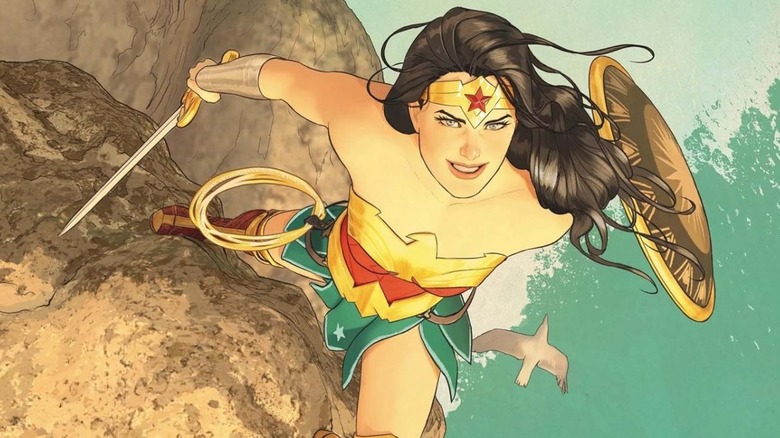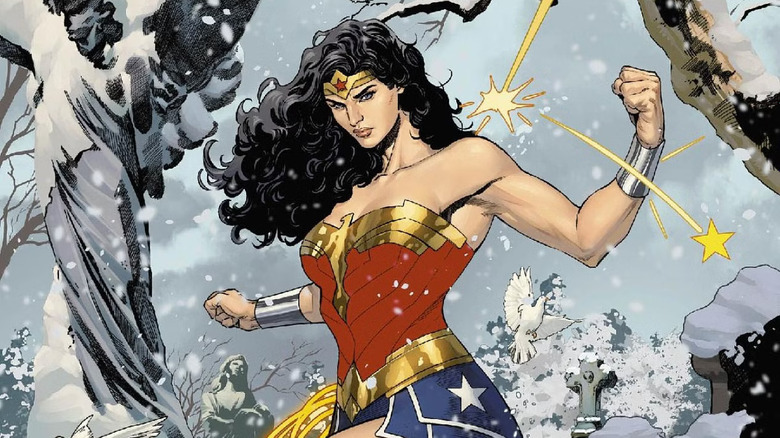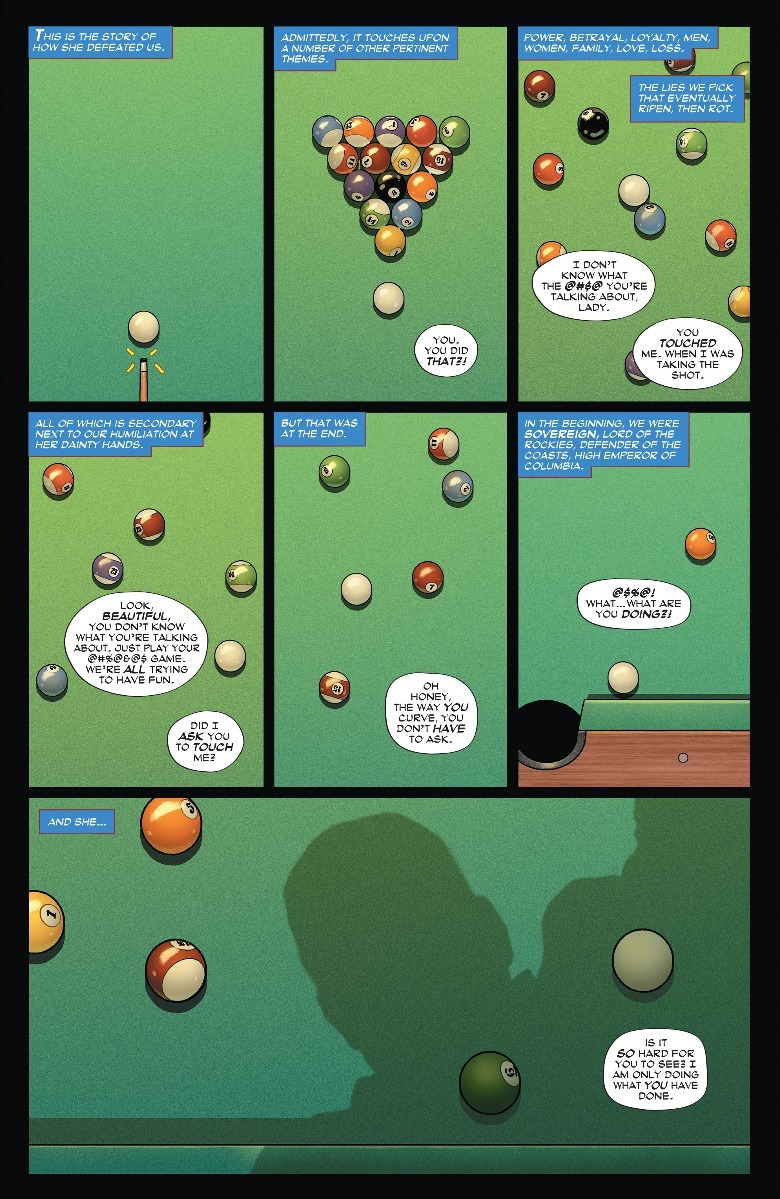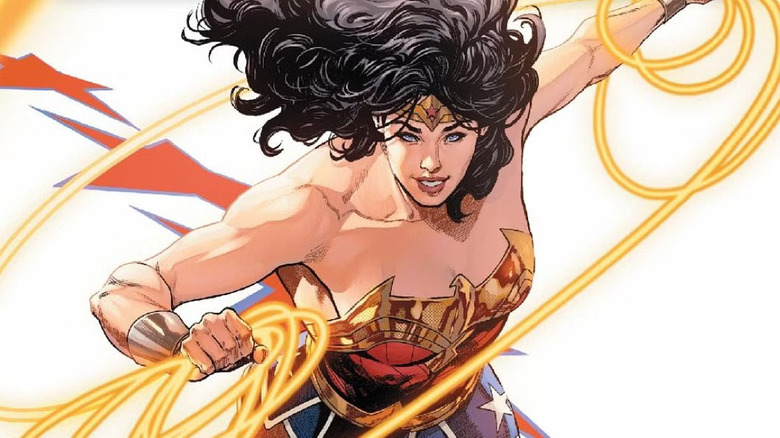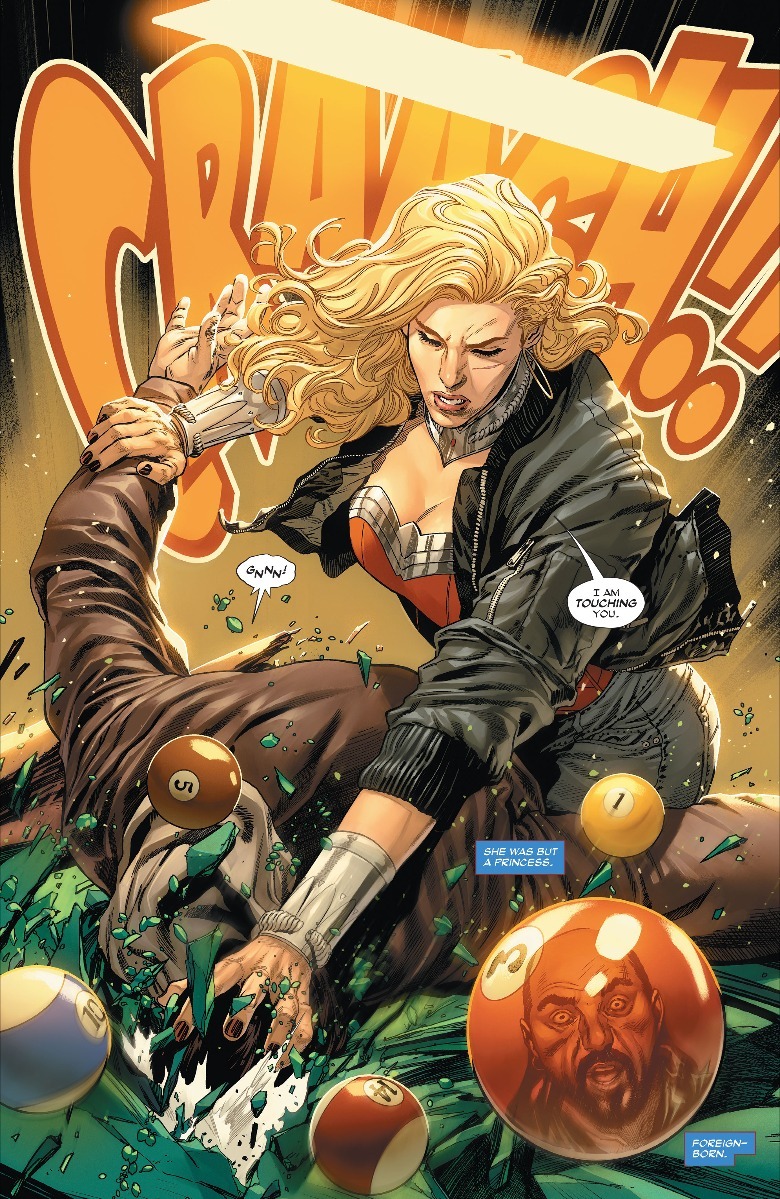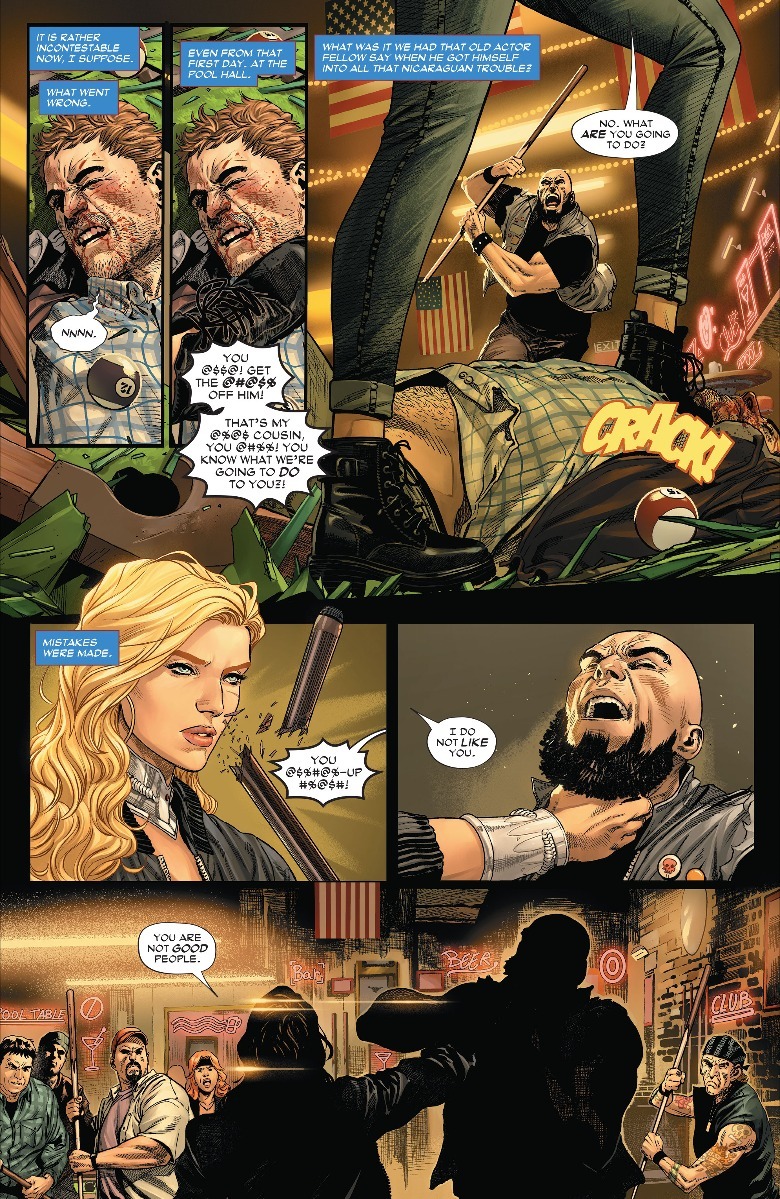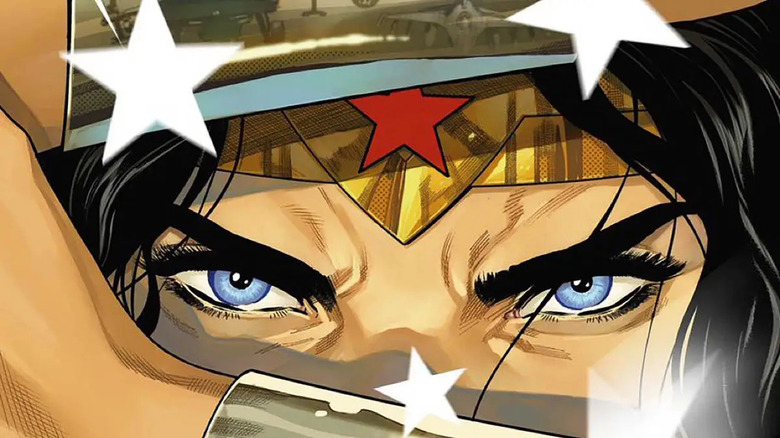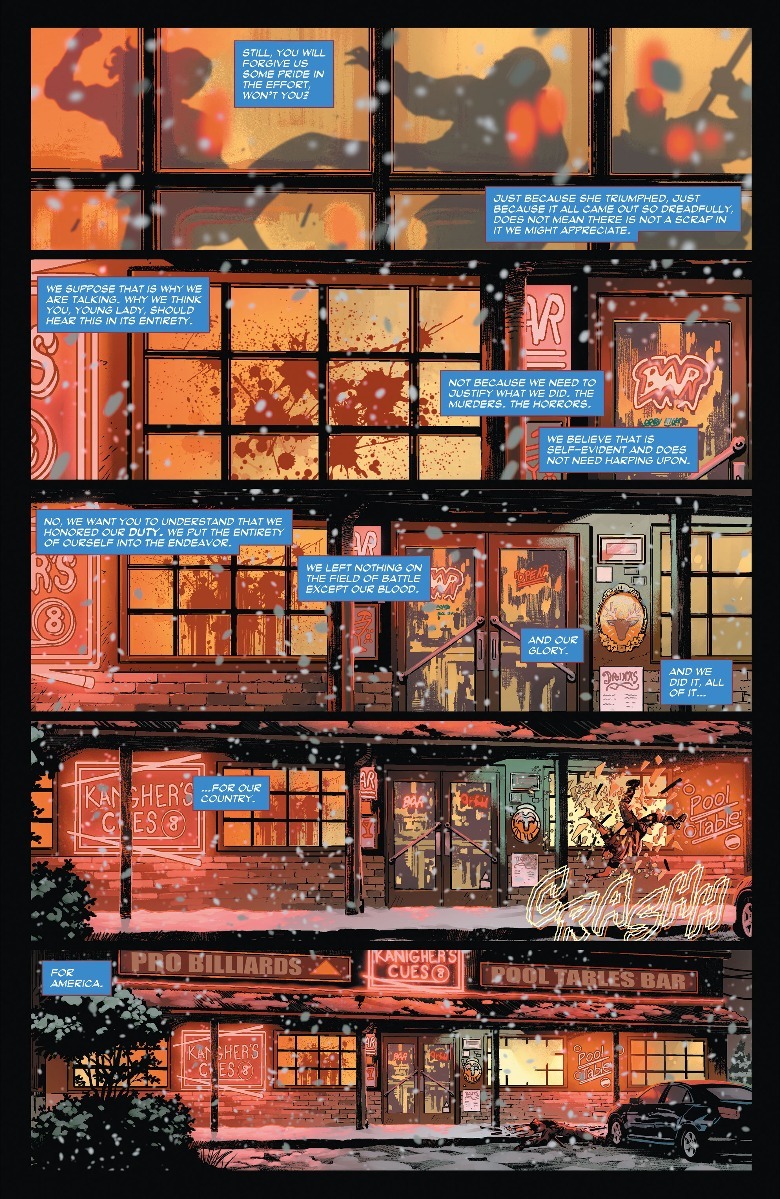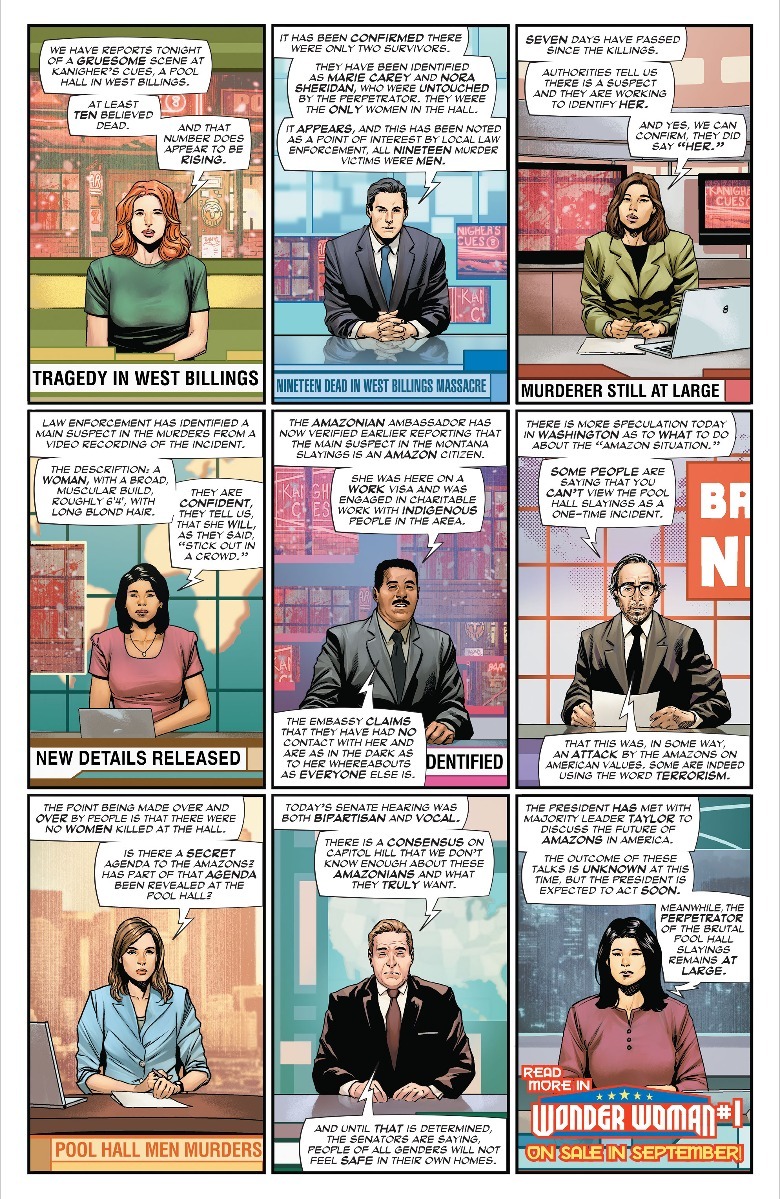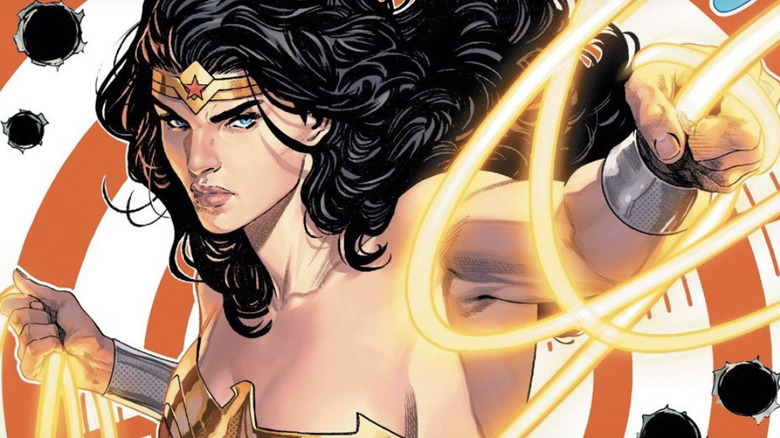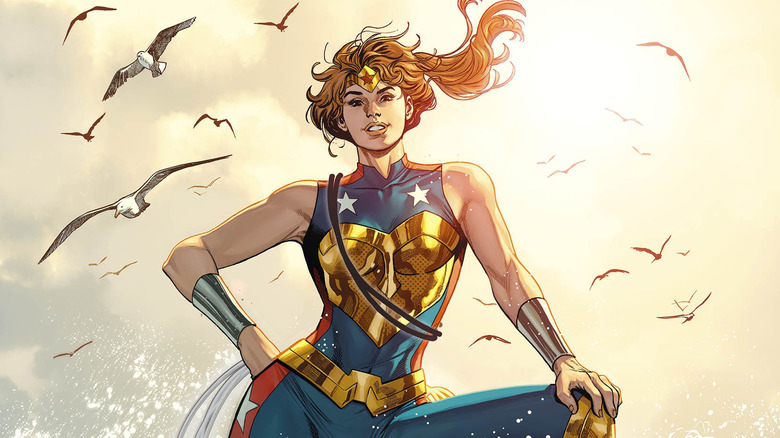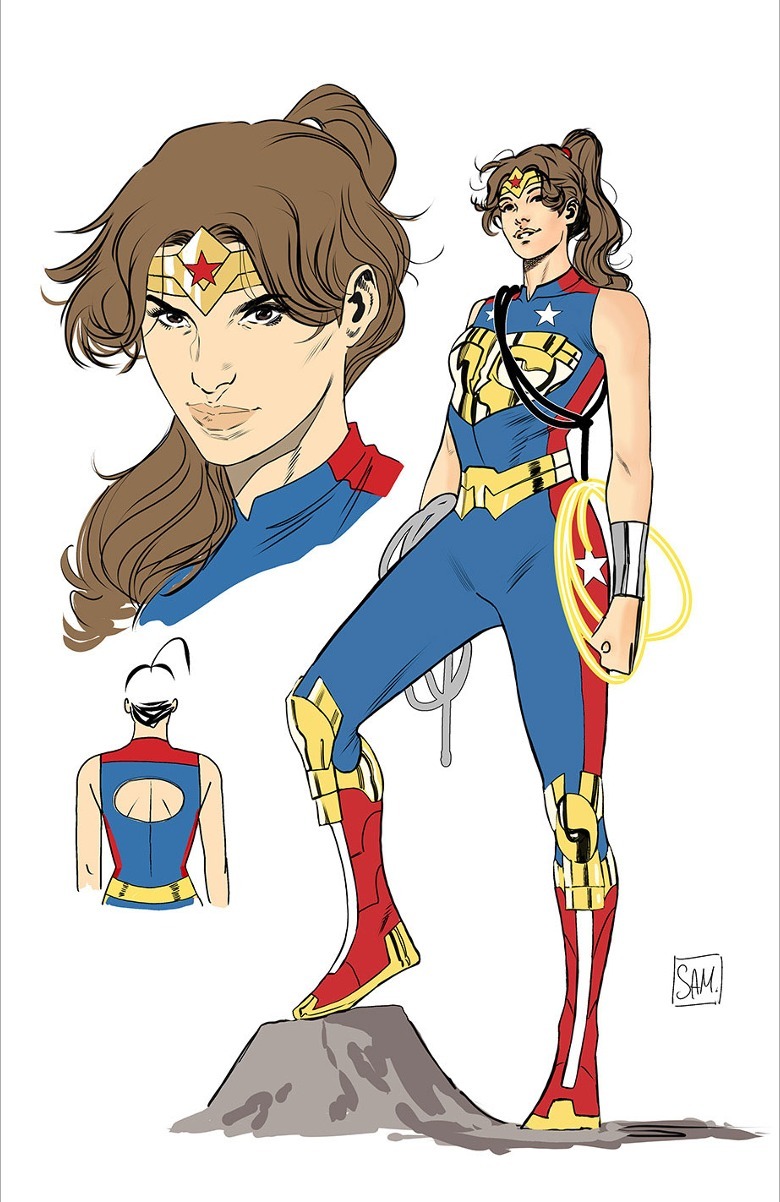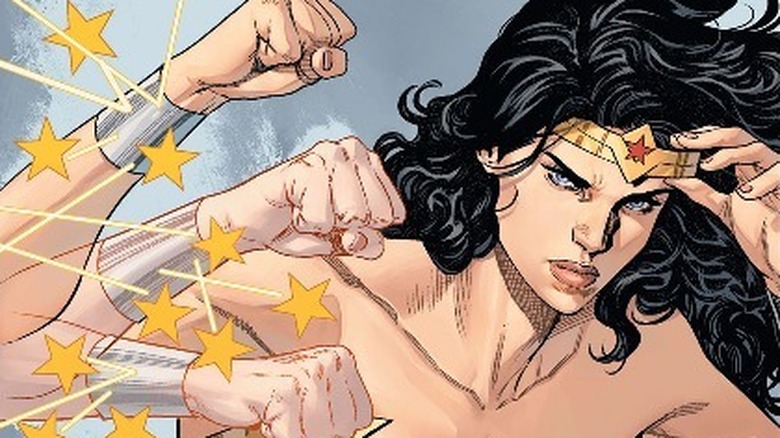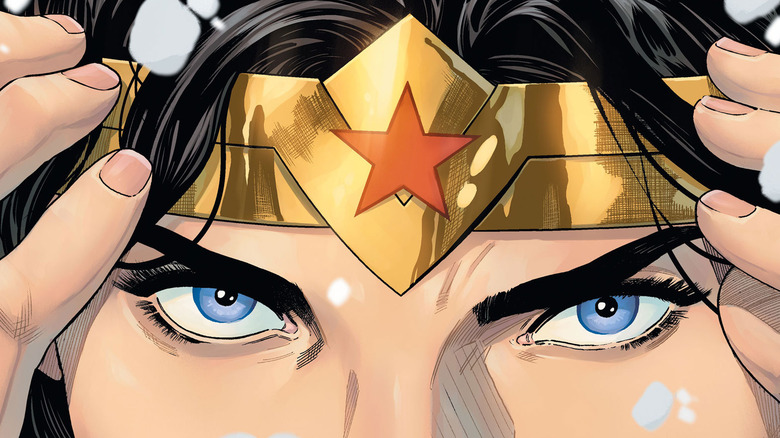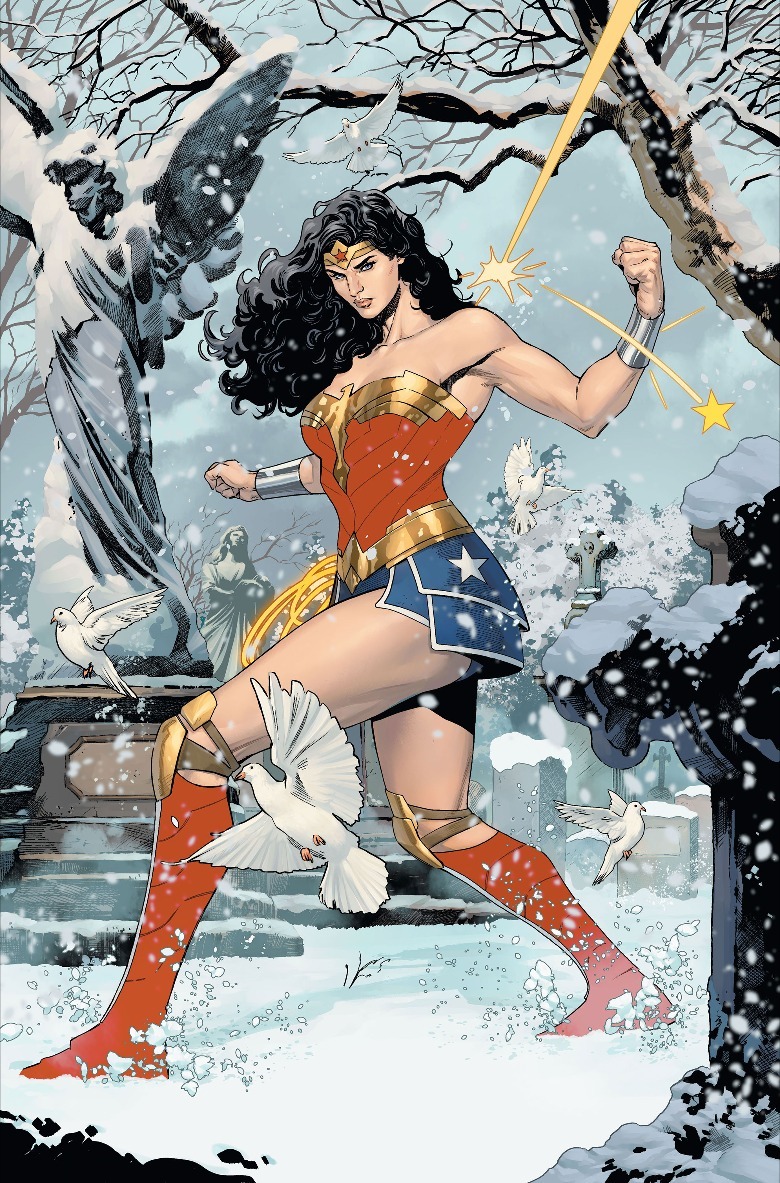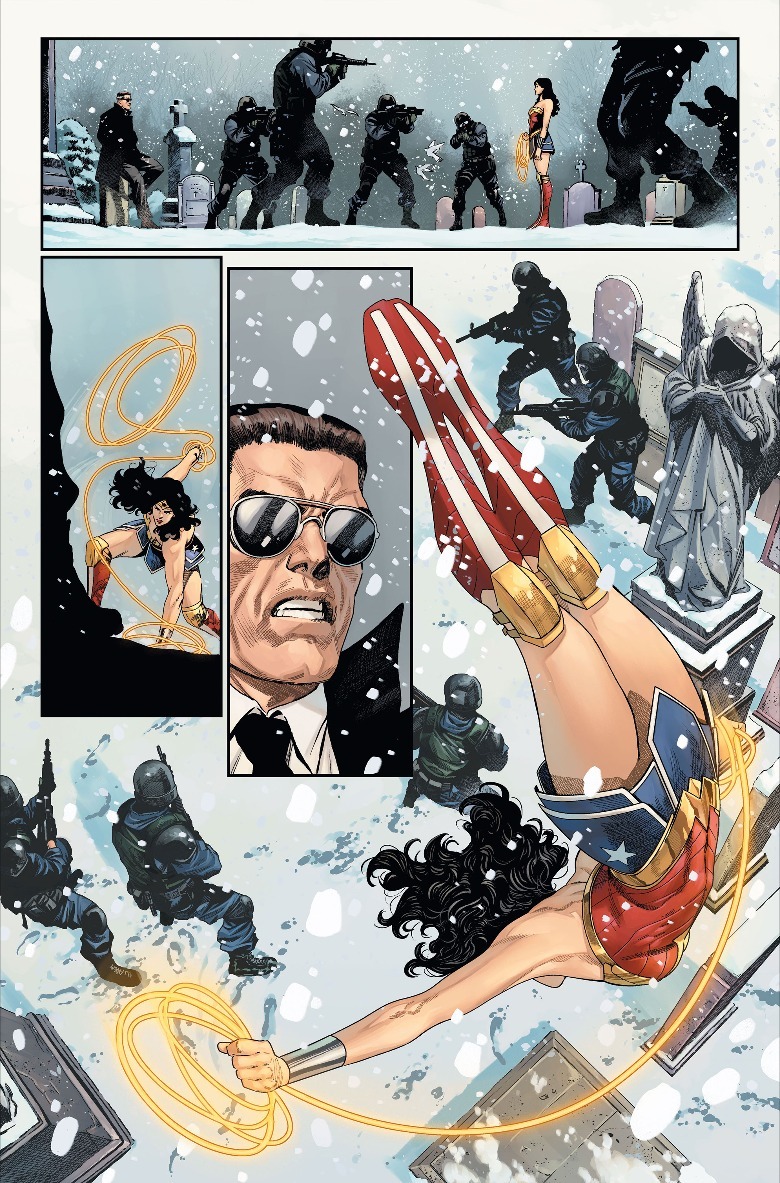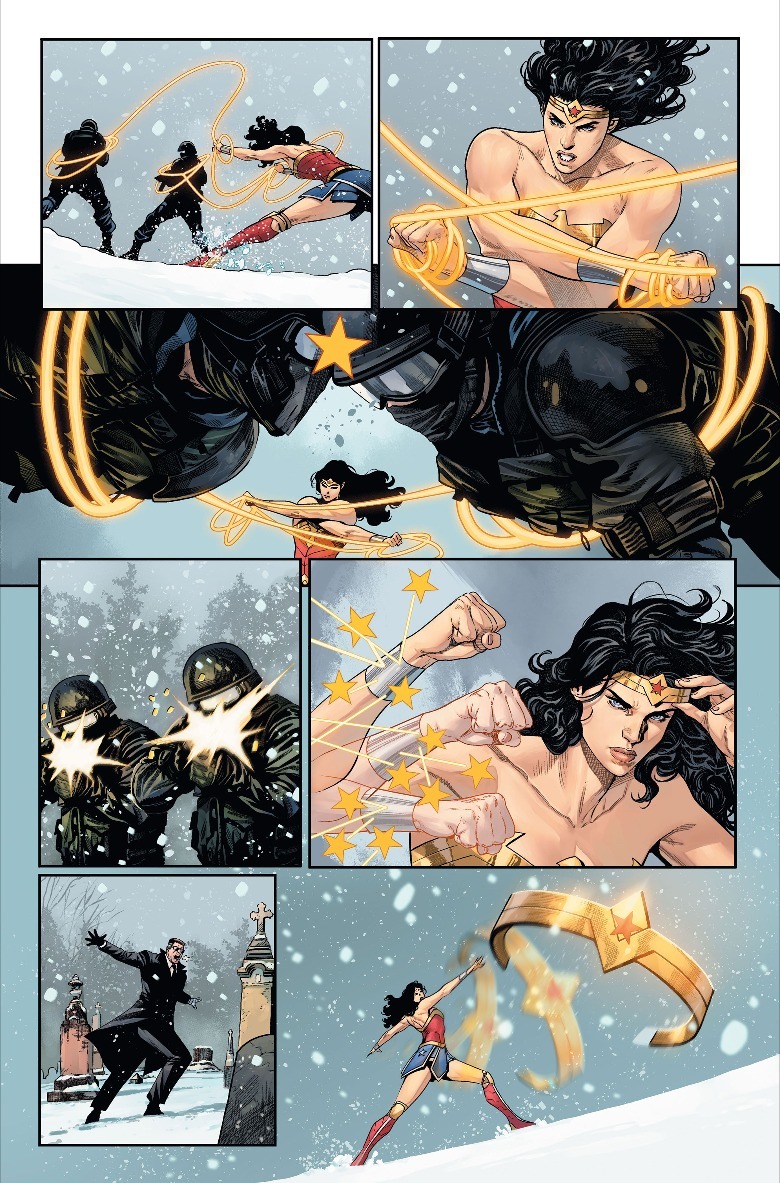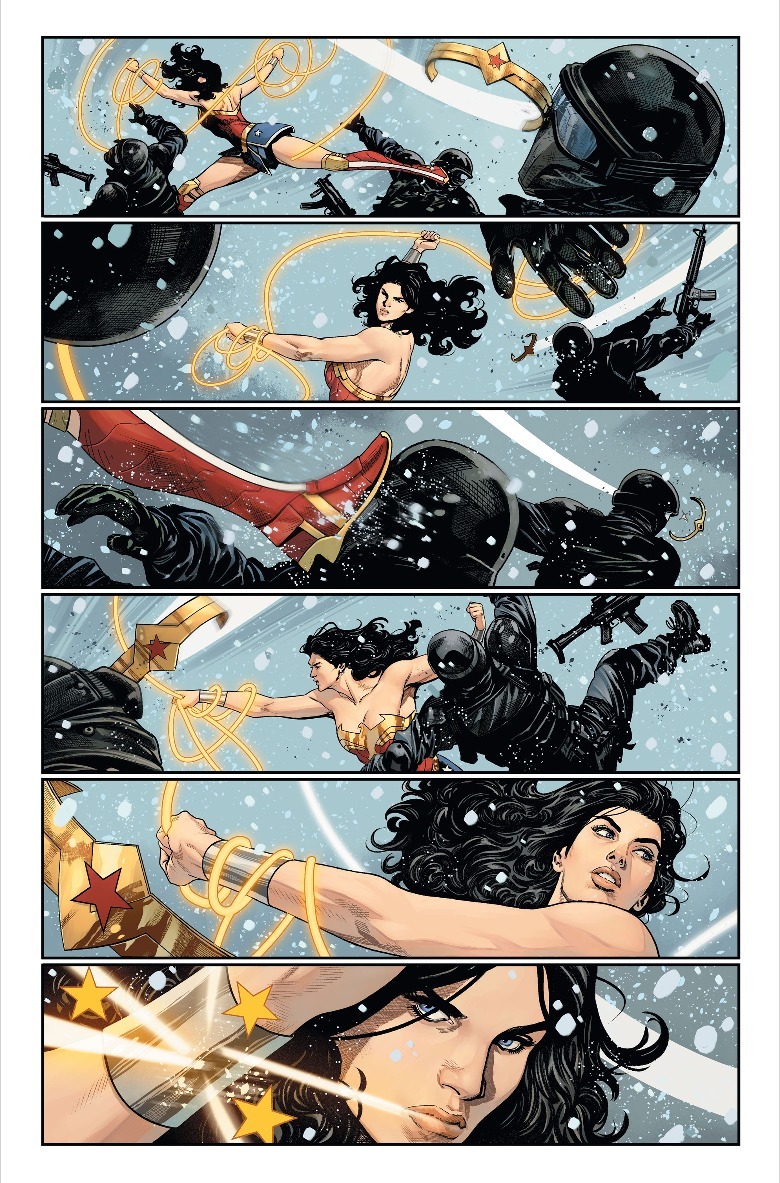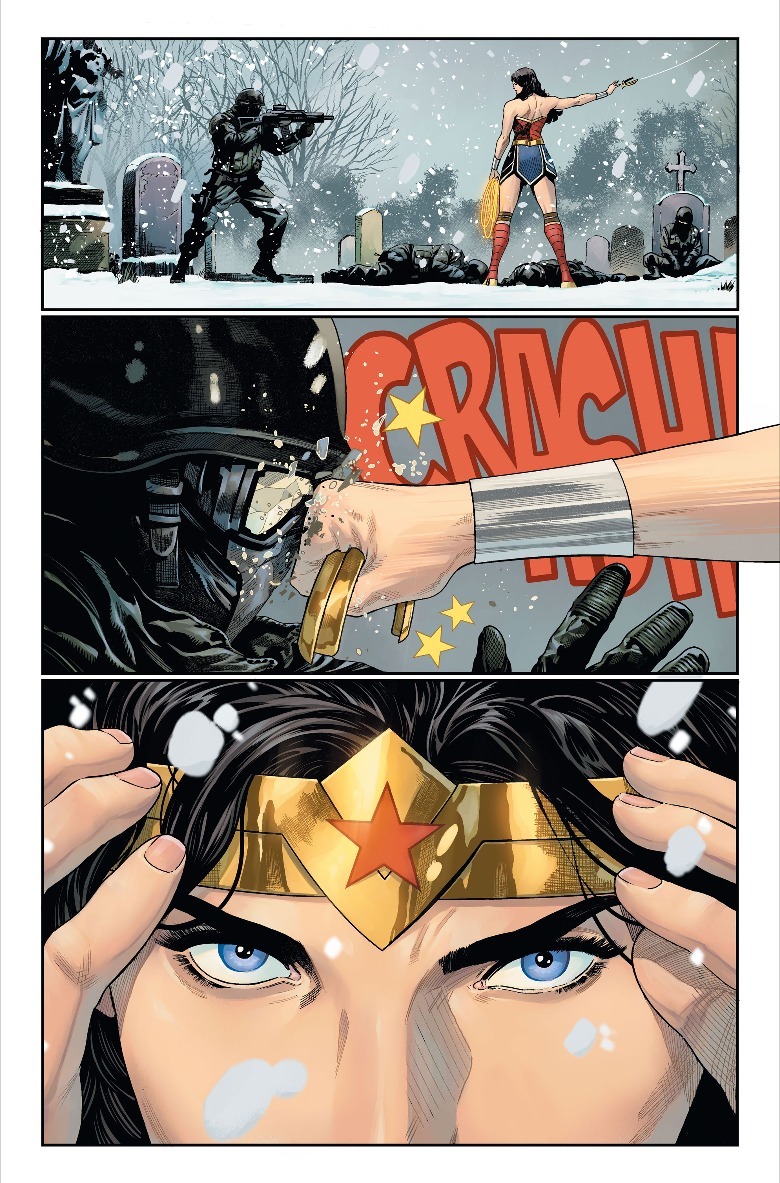Wonder Woman: Why Tom King Didn't Want The Superhero To Show Up Right Away In New Series - Exclusive Interview
Contains spoilers for "Wonder Woman" #1 by DC Comics
Fan-favorite comic book writer Tom King is ushering in the latest era of Wonder Woman with a brand new series, giving Diana Prince a much-deserved showcase in a story filled with political drama and action in a fresh take on the character.
In "Wonder Woman" #1 by King, Daniel Sampere, Tomeu Morey, and Clayton Cowles, Diana finds herself in a world where the United States bans Amazonians from living in the country following a deadly incident. Diana will face a dangerous new normal while taking on the A.X.E. task force, which will use deadly force to enact the law against those it believes don't belong in the country. We spoke with King about the series, working with Sampere, continuing the story of Trinity, and what readers can expect in the series. Check out our interview and exclusive preview of "Wonder Woman" #1!
Tom King was intimidated by writing Wonder Woman
How'd this chance to work on this series emerge?
I hadn't worked on an ongoing series since the end of "Batman," which is a while now — 2018, 2019. I've been in miniseries land, which I love. It's been a joy. I got to do "Human Target," "Strange Adventures," "Supergirl: Woman of Tomorrow" ... some big, awesome books. But it's been a while since I've been in main continuity.
DC reached out to me, and they were like, "Tom, it's time. It's time to come back, get in the waters." I was like, "No, that sounds scary and hard. I don't want to do that." Any time you have that feeling that sounds scary and hard as a writer — especially if you've been around for a while — you should lean into that so you don't get stale, so you keep taking risks. You don't want to do the same thing over and over again, ride your own coattails.
I was looking for an in-continuity book. We had basically discussed the Penguin. I'm always looking for Superman, but I'm kind of like Snape from "Harry Potter" where it's always taken by somebody else. My good friend Josh Williamson is doing a fantastic job, and he claimed that. They offered me Wonder Woman. I've been around for a decade at DC — I've seen a lot of Wonder Womans come and go. I was like, "No. Hell no. It's too hard. It's a trap of a series. It's a place that waves go to break."
Two things happened: Number one, they offered it to me with Daniel Sampere, which ... I know Daniel's coming off of being the event artist, being like a modern-day George Perez and a modern-day Jim Lee. I was like, "Oh, this isn't, 'Tom, take over Wonder Woman for a little while until we figure out what to do with it.' This is, 'We're putting on an A-list artist, and we're hoping to launch this book big and put our weight behind it and give Wonder Woman the love her fans have always given her, but on the publishing side,'" which is very appealing. And number two ... I've said this a lot, but I was at George Perez's funeral, and he had a little video because he knew he was going to pass. In the video, they interviewed him about what he was most proud of in his career, and he said it was writing Wonder Woman. I was like, "Of all the things he had done?"
He said, "Because no one had done ..." So many people had messed her up, and he was like, "I felt I did her right." I felt, in my arrogant writer way, that George was calling me out for my cowardice and being like, "Come on, buddy. Just because it's hard doesn't mean you can't get in the game." [With] those two factors, I was like, "All right, let's see if Wonder Woman is possible — if I can come up with something cool."
Tom King is tackling his first ongoing series since Batman
What was it like to tackle that complicated history and formulate something that worked for you?
Unfortunately, I came to "Batman" so early in my career — I'd been writing comics for a year and a half, so I was almost an amateur at the very beginning. But I did that. I did 85 issues. I did five years on "Batman." I've done big in continuity comics; I know the challenges. But this was harder. Wonder Woman is hard to write. I've written Superman; I've written Batman; I wrote Spider-Man for all of one panel once. But she's a very tough character.
She has a very bizarre history in terms of every two years for her entire career — 80 years, so 40 times — she gets revamped and redone and put into someone else's vision. That makes for a very complicated continuity between the very agenda-driven weirdness of her launch to in the '50s when she became almost like a joke character. In the '70s, they tried to make her a feminist icon and fell on their faces, to today ... It's hard to find the core of that character and what makes her awesome and what makes her as cool as the fans who love her. That's what I was looking for. It was difficult to express, to make sure I was doing it right.
What kind of complexities does Wonder Woman have when you're approaching a character like that?
The first person I talked to — I talked to Steve Orlando, who had written "Wonder Woman" for a while. I find Steve to have incredible insights into comic characters. Steve said to me — which stuck with me — he's like, "The world is not ready for Wonder Woman." That's why she's so hard. He's like, "She has almost militarized empathy. She's a radical in her way." That very much stuck with me. I was like, "Yeah, she is. She's a radical. The world's not ready for her. She's a rebel."
That's something different than Superman and Batman because that was what I was trying to find. Basically, if you ask someone what makes Wonder Woman awesome, there are so many things, but they'll describe [it] in the same way you could describe Superman or Batman. She's hopeful. She's kind. She's empathetic. She's strong. She never gives up. But most of those things you can [use to] describe Superman. A lot of them can describe Batman. So how do you make her unique? How do you make her cool?
There is something about her that people love that's different than how they love Superman and Batman. How exactly do we capture that? It was glomming onto that thing that Steve was talking about. There is an edge to her that isn't in Superman [or] Batman — the rebellious edge, the idea that she's not with the system, but she's against the system; that when everyone says yes, she says no.
[That] makes her not just appealing for 80 years but appealing today. When we have comic book readers coming into stores today, this younger generation, they're rebellious. They've seen a system that in some way — in a lot of ways — failed them. Between the economy and COVID, they've really had the s*** thrown at them, and they're rebelling and trying to find a better way. I think Wonder Woman can represent that energy that they're bringing, that the modern comic book reader is into.
Wonder Woman's story parallels real life
How does this book reflect the real world, specifically the introduction of A.X.E. [Amazon Extradition Entity]?
One of the things I do love about [Wonder Woman] is she's a Washington, D.C.-based character. I'm one of the few Washington, D.C.-based comic book creators. I've been here for 23 years. I spent my twenties working for the government in various capacities. My wife still works very closely with the government. I live two blocks from the Capitol. I was walking my dog, watching the riots happen.
When I started "Wonder Woman" or started thinking about her, we were literally in the military zone that we had created — this was two years ago — that was created around the Capitol. I had soldiers stationed outside my house. All of that stuff ... I wanted to make this a bit of a Washington story. Not a political story, because I don't want my comic books to look like a Twitter feed. I don't want to be preaching to anyone. I want to be talking about how heroes fit into the world. But I thought it should be a political thriller, like a "Hunt for Red October" thing, like an awesome Tom Clancy thriller but more modern. I started thinking about that. I also had in my head that she would be against the government ... She's like the Hulk. I had a vision in my head of her fighting tanks. If you see that, that's in Issue 2.
She has that paranoia that everyone's coming after. I was like, "But why? Why would she fight?" Then that phrase that people use — I remember when there was that thing where we did the Muslim ban, and I thought that was so f***ing terrible because I had spent a lot of time living overseas in Muslim countries. I remember this idea that, "Well, until we figure this out, we have to be careful," and how they use that as an excuse to do terrible things. I was like, "Let's start with that."
I talked to my editor, Brittany Holzherr — we had a long conversation about this. She's a brilliant editor. She's like, "What would start that? What would provoke that?" That's where we got the idea of how the issue starts, which is inspired by Marvel's "Civil War" — the idea that there's an incident that happens where a superhero does something wrong and the government reacts to that. That's where we started. Then there's that thought of, "Well, until we can figure this out, let's do something," and then starting this evil cavalcade that eventually becomes this gathering storm that hits Wonder Woman.
On the burden Wonder Woman carries
How important was it to remind readers about Diana being a warrior, and how difficult is it to show off flaws in a character that literally is designed not to have many?
I came up as an intern for Chris Claremont. That was where I first learned story when I was a kid. Every day I'd go into the room, and Chris was telling me how his stories worked, and it was a lesson. Chris' thing was for every superhero, what makes them strong makes them weak, and that's how we make them interesting. Rogue's power is also that she can't touch somebody — that being the classic example. Or Wolverine — he's savage, and he's always having to overcome his own savagery, and that creates the tension. That's always been a thing with me. Looking at Wonder Woman, I was like, "She is that character."
I compare it with Wolverine, where she is, like Steve Orlando said, someone who loves peace and is empathetic. We're not prepared for it. In order to have that peace, she's constantly fighting. With every punch she's throwing, she's kind of failing. That Chris Claremont aspect of Wonder Woman, that Wolverine, that Rogue aspect of her ... That's not like Batman. That's not like Superman. That's a burden that only she carries, that she is a warrior, but she's a warrior for peace. What does that mean? What does that contradiction do to someone? It's fascinating, and we're going to explore that for as many issues as we can.
How much of the supporting cast can we expect to see? She has a very big and popular collection of characters, including Artemis, Yara, etc. Can we expect to see them, or is this book more concerned about refocusing Wonder Woman and her place on the Trinity in terms of being one of the big three?
To answer the second question first, yes — the focus of the book will be on Wonder Woman. She's the center of it. This is a book along the lines of what we did with Supergirl. We do it with "Superman: Up in the Sky," where the book is not about the deconstruction of Wonder Woman. She doesn't need to be taken apart and put back together and sadly looking out windows and all that stuff. She needs a place to shine. She needs to reflect the awesomeness of the love that goes to her, and that's what the book is. She's at the center of it. The theme of every book, every page, is "Wonder Woman is awesome."
I want to answer the question that people have asked over and over, which is, "Why Wonder Woman? Why is she the number one female superhero in the world, not just for comic books, but for little kids and little girls throughout the world? Why is she number one?" That's the theme of the whole book. That said, this is a huge story that starts in Issue 1 and will expand out, and it involves every Amazon, every villain. You will see the Wonder Girls in the first five issues — Yara, Cassie, and Donna. You're going to see some big villains, huge ones, Circe and Grail.
There's going to be big villains. Big people are coming. Her history and lore will play with this. I've read Wonder Woman pretty consistently throughout the years, but I hadn't read all of it. I spent a lot of time doing a lot of research, reading Greg Rucka, reading Gail Simone, reading Phil Jimenez, reading Bob Kanigher, and William Messner-Loebs. I want to get a ton of that background in there.
Creating Trinity, the daughter of Wonder Woman
How is this book going to continue the story of Trinity, Wonder Woman's future daughter you recently introduced?
The main story of this book is the origin of Trinity, the creation of who Trinity is and where she comes from. Obviously, Trinity's the daughter of Wonder Woman. In #800, we saw the story flash-forward 20 years in the future, basically. Trinity was 19, and you saw what she becomes. She's the daughter of Wonder Woman. She has relationships with Damian [Wayne] and Jon [Kent]. This will be how she's born, who her father is, what her fate is. Trinity has three lassos — what are those three lassos? Where do they come from? All those questions that were raised in #800 will be answered by the main series.
Was it daunting to create a new character related to Wonder Woman?
It was daunting, not least because I'm terrible at creating new characters. I did a lot of Batman — never made a good Batman villain. I'm super proud of my run, but my expertise is in revamping other people's stuff. I've created new characters. I know Gotham Girl set the world on fire ... But my legacy as a writer has mostly been taking others' work and elevating it.
It was intimidating to be like, "I want to create a character that has lasting impact, that a lot of people want to play with, that a lot of people want to write." The idea of creating ... It was so natural to create her because Batman has a son and Superman has a son, and it feels like there's an obvious missing hole in the DC universe that we were trying to fill. That part of it was easy. But it was intimidating because I do very much want to get something that catches on and that lives beyond me writing her.
What are you most excited about for readers about this project? It's a nice curveball in terms of what people might expect from you.
I have a 13-year-old daughter, and this is the book she asks me about when I write it. She wants to know, for every issue, what's going to happen, what's happening. I'm also doing some backups using Trinity, and she loves Trinity as a character. I'm most excited for writing a book that my daughter is ecstatically interested in. That mostly excites me, and making a book that makes her proud is what I'm very excited about.
Daniel Sampere brings the goods on Wonder Woman
What was it like to get the first pages from Daniel Sampere?
I was bowled over. It reminded me of getting pages from Clay Mann for "Batman/Catwoman." You reflect on where you were when you were 12, and when I was 12, the Jim Lee-Todd McFarlane revolution was happening. That's the school it's from, and that's the art I was raised on, that Rob Liefeld/Mann. Do you know how many copies of "X-Force"#1 I bought? That kind of energy makes you want to go out and play superheroes. You see Wonder Woman throw a punch, and you want to throw a punch in the air and pretend you're hitting something.
Don't get me wrong — I love grounded indie comics, but sometimes you want a comic book that looks like your fantasy of what a comic book should look like. That's what Daniel's art looks like. On top of that, he's been so prolific in terms of speed that he's ... I don't want to throw him under the bus, but he should be something like 10 out of the first 12 issues, to have that perfect arc, which is almost unheard of to have an A-list artist do 10 of the first 12. In modern comics, it's flabbergasting that would ever happen again, because most comic artists are two to three months an issue now. To have him hit those deadlines is insane.
Wonder Woman is coming soon!
Check out our exclusive unlettered preview of "Wonder Woman" #1, which features Diana Prince emerging against A.X.E. and fighting against the agents. The pages show off Wonder Woman's incredible fighting prowess as she uses her fists, gauntlets, tiara, and Lasso of Truth to take down the gun-wielding foes. Underneath the final preview page is the text solicit for the upcoming issue, teasing the challenges Diana and the Amazonians are about to face.
"THE AMAZON WARRIOR IS NOW A WANTED OUTLAW! A NEW ERA FOR THE AMAZON WARRIOR BEGINS, FROM THE SUPERSTAR TEAM OF TOM KING AND DANIEL SAMPERE! After a mysterious Amazonian is accused of mass murder, Congress passes the Amazon Safety Act, barring all Amazons from U.S. soil. To carry out their plans, the government starts a task force, the Amazon Extradition Entity (A.X.E.), to remove those who don't comply by any means necessary. Now, in her search for the truth behind the killing, Wonder Woman finds herself an outlaw in the world she once swore to protect! Writer Tom King (BATMAN, MISTER MIRACLE, SUPERGIRL: WOMAN OF TOMORROW) and superstar artist in the making Daniel Sampere (DARK CRISIS ON INFINITE EARTHS, ACTION COMICS) join forces for this action-packed relaunch and the beginning of what will undoubtedly become a groundbreaking run on the character."
"Wonder Woman" #1 from DC Comics arrives in comic book stores on September 19, 2023.
This interview has been edited for clarity.
